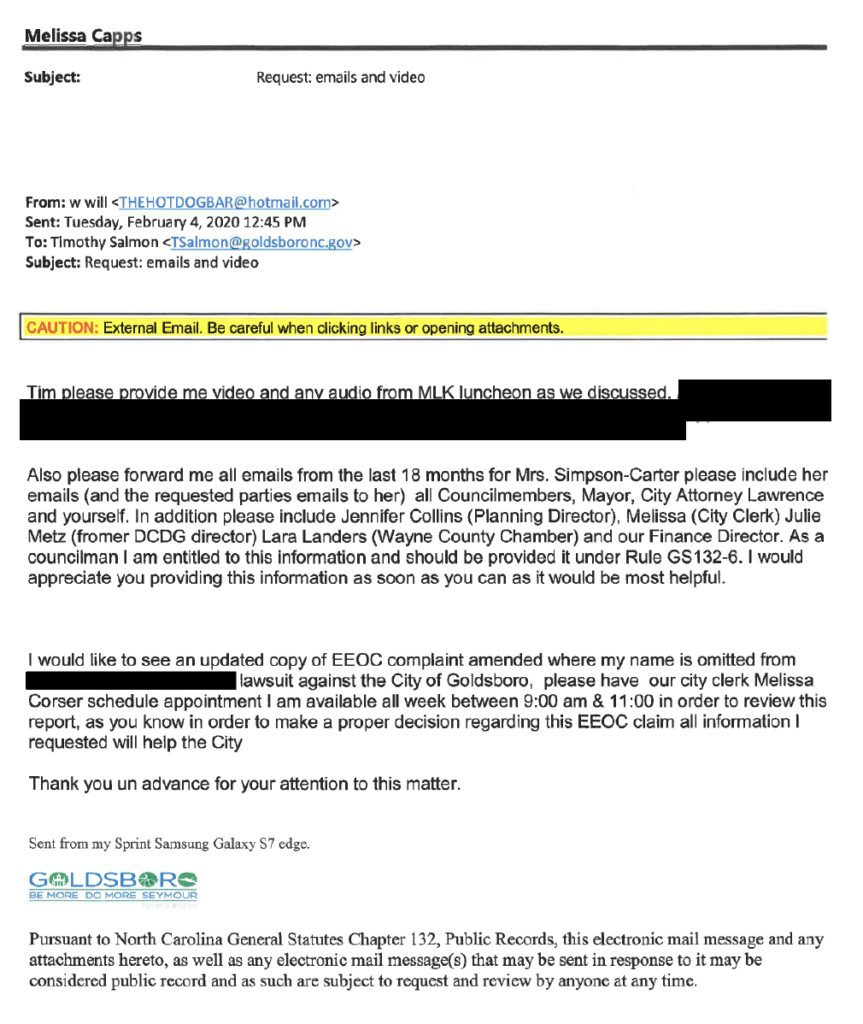
A dispatch from Monday’s City Council work session: Things that make you go hmmm
We were pleasantly surprised when, during the Goldsboro City Council’s recent work session, District 1 Councilman Antonio Williams stood up for public records law.
Surprised because this is the same Mr. Williams who, less than a year ago, defended his opposition to people requesting his “personal emails” by declaring that the 4th Amendment protected the communication.
The email in question was, in fact, sent to his city email account via the city’s website, making it, by definition, public.
And the 4th Amendment, for those of you playing at home, guarantees “the right of the people to be secure in their persons, houses, papers, and effects, against unreasonable searches and seizures.” It makes no mention of public records law, nor is a lawful records request at odds with protection from unreasonable search and seizure afforded under the Constitution.
But that’s not where the irony ends.
This publication has actually requested public records from Williams — and followed up on that request multiple times. We have waited for months and he has still not responded.
So, you can imagine our surprise when the councilman spoke out in support of a recent records request.
But it also made us curious as to just why he was changing his tune.
For those of you who didn’t see the meeting on Facebook — the city requested that people do their best to stay away, amid rising COVID-19 preventative “social distancing” practices — here are the basics.
City Manager Tim Salmon raised, with the board, a concern that arose during the processing of a recent records request from a member of the public.
The citizen had asked for every email sent by several members of the city’s staff and elected officials for the last 18 months.
The city’s Information Technology Department spent nine hours working on the request and discovered some 344,000 emails.
Here’s the problem. North Carolina, unlike, say, Florida, protects certain records. That means the emails must be sorted and, in some cases, redacted before they can legally be released.
Yes, that’s a bummer. Particularly for journalists. It prolongs the process and often means the request isn’t fulfilled in a timely fashion. And certain information — like why a public figure was fired — is rarely made available, leaving questions that, in some cases, many feel would be in the public’s interest to know the answers to.
So, given the need to thoughtfully examine each record for release to avoid potential lawsuits, it takes time and effort. Now multiply that time and effort by 344,000.

You get the picture.
As Salmon put it, if every email only took one minute to be reviewed, and a single staff member was in charge of the request, that person — earning a salary paid for by the taxpayers — would spend more than two years going through each of the documents requested by this citizen.
“In this case, if it takes an estimated one minute per email, that is over 5,700 hours of work — or two years and nine months of work for one person,” Salmon told the board. “That is what I would call excessive.”
And if measures aren’t put into place to ensure frivolous requests aren’t made — we are not, at this point, saying this particular request is frivolous — anyone with an axe to grind could, in theory, essentially shut down City Hall and drain city coffers.
Imagine if this publication decided to evoke the Freedom of Information Act to request every email every councilmember has ever sent. Legally, we could do it. And legally, the city would have to honor our request.
But it would literally take years to produce those documents.
So, the reason we — and other news organizations — don’t do things like that is not because we don’t care about transparency. It’s because we would rather chase stories that come to us from vetted sources with real information than to go fishing for sharks with a Fisher-Price fishing rod.
In other words, records requests should be purposeful and not trips down the rabbit hole in search of a smoking gun that might or might not exist.
So, what’s the solution?
Salmon suggested charging those who request documents a fee should the volume be deemed “excessive.” There is actually a provision that allows for this in G.S. 132-1 that reads:
“Notwithstanding the provisions of this subsection, if the request is such as to require extensive use of information technology resources or extensive clerical or supervisory assistance by personnel of the agency involved, or if producing the record in the medium requested results in a greater use of information technology resources than that established by the agency for reproduction of the volume of information requested, then the agency may charge, in addition to the actual cost of duplication, a special service charge, which shall be reasonable and shall be based on the actual cost incurred for such extensive use of information technology resources or the labor costs of the personnel providing the services, or for a greater use of information technology resources that is actually incurred by the agency or attributable to the agency.”
If not, for this particular request, it would run the city hundreds of thousands of dollars in labor costs.
“I ran 5,700 hours by $33 an hour just for the clerk to go through it, and it’s $188,000,” Salmon said.
And that isn’t where the work ends. The documents would still have to be reviewed by her supervisor, Salmon, and the city attorney who makes way more than $33 an hour.
So, invoking the right to charge as allowed by G.S. 132 makes sense, right?

Councilwoman Brandi Matthews didn’t think so.
“I mean, I don’t think we should charge at all, but the word excessive could also be left to interpretation, so what is your definition of excessive?” she asked.
“We’ve checked with some other agencies and I think the state went by four hours of work,” Salmon replied. “We’ve far exceeded that already.”
Ms. Matthews isn’t totally wrong. The city should attempt to define excessive.
But in this case, which is why the battle began, we’re pretty sure 5,700 hours of work is excessive.
Mr. Williams continued to fight.
What if, he asked, it was a council member, not a citizen, who made the request? Would he or she still be charged?
City Attorney Ron Lawrence said yes.
“When an individual council member makes a request, they are treated as a citizen,” he said, adding that if the council voted to access records, that would be a different scenario.
Mr. Williams disagreed.
“We are the gatekeepers for the citizens. We are the gatekeepers to make sure there’s transparency in place,” he said. “That’s illegal.”
Why the strong reaction?
Surely, Mr. Williams didn’t have an ulterior motive here.
So, we did some digging, ironically, by making a records request.
Here’s what we found.
The emails at the heart of the request made by the “citizen” belong to Community Affairs Director Shycole Simpson-Carter.
Now that’s odd.
Why does that name sound familiar?
It turns out, Ms. Simpson-Carter is the same city department head who filed a discrimination complaint against Mr. Williams that resulted in an ongoing investigation into the councilman’s behavior by the Equality Employment Opportunity Commission.
Imagine that.
And the other emails the “citizen” wanted were from, well, just see for yourself:

And what do you know, the request was filed by “a councilman” whose email address, THEHOTDOGBAR@hotmail.com, gave the name “w will.”
Read that again.
Could this request have come from Mr. Williams?
Is he attempting to use city staff — and loads of taxpayer dollars — to gather information about the woman who is currently suing the city and accusing him of discrimination and creating a hostile work environment.
If so, mind-blowing would be one way to characterize it. Brazen would be another.
So, we did another search, on Facebook.
Turns out there is a page for “The Hotdog Bar” in Goldsboro. Here’s one of its posts:

Say, that looks like Mr. Williams.
The plot thickens.
But hey, now that Mr. Williams is a friend of public records law, we fully expect him to comply with this publication’s months-old request.
You know, now that he’s seen the light.
Don’t worry. We won’t hold our breath.
But no, Mr. Williams, if you are, “councilman w will,” the city staff is not your legal team.
And no, we won’t stop digging — whether the city decides to lawfully charge us for the I.T. Department’s time or not.

A loaded discussion

Fighting for their lives

Goldsboro loses a giant

“I’m a flippin’ hurricane!”
Public Notices — Feb. 8, 2026

Belting it out

Legendary

Final Four!


